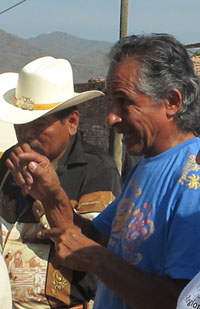
We’ve received troubling news from our partner organization, FASOL, in Mexico. One of our longtime advisors and a prominent activist in the anti-dam movement in western Mexico has received death threats for his activism.
Juan Francisco Garcia, Director of Grupo Ecológico Manglar (Mangrove Ecology Group) of San Blas, Nayarit, Mexico, and members of Pro-Regiones (Pro-Regions), a group with members in the cities of Tepic and Ruiz, Nayarit, have received threats against their lives and families. The demands have called for a halt to their efforts to raise awareness of the potential negative environmental and social impacts of the proposed Las Cruces hydroelectric project.
A project with harmful effects; communities without all the information
The Las Cruces project proposes the construction of a dam on the Rio San Pedro, one of Mexico’s last free-flowing rivers. The river is a critical resource for communities in the area who rely upon it for agricultural water and fisheries, and it is a major feeder into the Gulf of California and Mexico’s Marismas Nacionales, a protected mangrove ecosystem that’s a critical component of the broader Gulf ecosystem.

As is the case in too many places, Mexico’s environmental assessment system has neglected public participation at the outset of a project, and it has failed to look at broad, region-wide potential effects. In this case, for example, the coastal fishing industry’s production will be disrupted by changing freshwater flow and salinization levels. Additionally, there will be climate change impacts.
In the case of Las Cruces, it is the communities (both Mestizo and Cora indigenous) that comprise the town of San Pedro Ixcatán that have the yes or no vote over exploratory permits and all of the permits that will be required prior to construction. Mexico’s Federal Electricity Commission (CFE) has done a lot of outreach in the communities promising that the dams will lead to jobs, cheap electricity access, and other benefits. The communities are isolated and have very few economic opportunities, which has led to a significant migration of young men, so these promises have gained some traction.
A leader taking up the cause
Juan’s effort is multifold: he’s trying to get the community to be wary of the promises made by the government; he’s also encouraging them to incorporate the broader potential environmental impacts of the project into their decision. He and Pro-Regiones—an organization comprised mostly of student volunteers from the Autonomous University in Tepic—have organized a series of community meetings that bring in representatives of similar dam-affected communities; fisherman from the coast to talk about their livelihoods; lawyers and scientists to talk about the ecological consequences the dam might have.

These are highly unique community meeting opportunities in San Pedro Ixcatan, and without them many members of this town would know nearly nothing about this dam. Instead, the Federal Electricity Commission would work directly with the local municipal council to secure the approval vote it needs for the exploration phase.
The threats and extortion have occurred via phone and email. Juan’s family has been followed in San Blas, although he has since left.
Global Greengrants Fund was party to a petition to raise the visibility of this situation among Mexican authorities. We can only hope that the state will provide protection for Juan and his colleagues and prosecute those who aim to intimidate.
